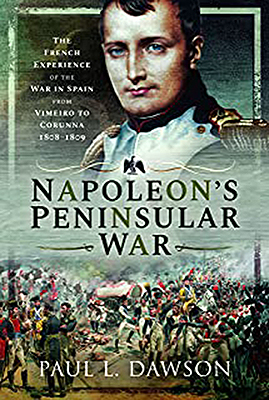Book
Review:
Napoleon's Peninsular War:
By Paul Dawson


I have lost count of the number of books I have read on the Napoleonic Wars, but few have drawn me in as much as Napoleon's Peninsular War by Paul Dawson.
As the title suggests it follows the French army's campaign in Iberia during its first year and it does so with detailed examinations of the military situation and through correspondence between many of the key figures on the invading side.
Through the pages of Napoleon's Peninsular War you see the reasons behind the French strategy of trying to subjugate the various regions of Spain and why the Emperor's plans often went awry.
Often outnumbered, France's armies and their leaders had to not only keep their eyes on the enemy, but regularly glance over their shoulders at the shadow of their ruler.
Near Burgos Mashal Jean-de-Dieu Soult found himself forced to go on the front foot against a larger Spanish army under General Belvedere.
As Dawson writes: "Therefore once he received this order, Soult knew he had reinforcements on the way. He had orders not to attack if he was outnumbered, but knew very well from the final sentence of his orders that attacking immediately was the only option to keep the Emperor happy."
Needless to say Soult's command skills led to a convincing victory over his enemy.
By delving into the letters to the Marshals operating in the Peninsula, Dawson shows how the command system of Napoleon's army worked - both well and not so well.
The Emperor knew what he wanted to achieve and set tasks for his senior men, these were then put into a series of orders by Marshal Berthier - the indespensible Chief of Staff - and sent out to the leaders in the field to (hopefully) follow.
It is obvious many French commanders had Napoleon's confidence - such as Lannes and Soult - while others began the war well but then lost their way. Victor, for example, continued his excellent work from Friedland in his first year in Spain but "by early summer 1809 his own over-confidence in his own ability and his swollen ego from his easy successes, led him to fatally compromise the Battle of Tudela".
Marshal Ney also cops a serve when his "bungling" allowed General Palafox's defeated army to escape ruining a plan that could have seen Spain's army defeated completely. Instead it was able to continue the fight elsewhere and Palafox survived to win stubborn and ultimately-futile glory at Zaragoza.
Errant Marshals and generals were not the only ones to feel the wrath of an impatient Emperor. At Somosierra Colonel Pire was sent to see if it was possible to force the Spaniards from the positions they had blocking the road to Madrid.
The fire he encountered was so severe Pire barely got away with his life and in a shaken state reported to Napoleon that it would be impossible. For his honesty he drew a swipe from the Emperor's whip and "the blow was only escaped by a quick movement in retreat", reported Lieutenant de Gonneville of the 6th Cuirassiers.
Next Bonaparte sent his ADC Louis de Segur to check the position. Mindful of Bonaparte's furious state he estimated the 20 battalions of Spanish infantry and 16 guns lining the slopes could deliver "40,000 discharges of musketry each minute" along the narrow roadway.
"It does not matter," he said, "the Emperor is there and he insists on the thing being settled. Come ... the honour will be ours, advance by squads and forward."
The unbelievable Polish charge that followed has gone down in history as an astounding moment in warfare.
The regiment carried the day, plus all of the Spanish guns, 10 flags, 30 artillery caissons and wagons, and scattered or killed the defenders.
The Polish horsemen lost 57 officers and men killed or wounded.
Dawson covers the French advance to Corunna in detail and then uses Marshal Soult's own reports to describe the battle. He uses the same eyewitness technique to add personal colour to Somosierra.
The author also passes judgement on whether or not the initial French invasion of Spain was a success or not. I shall leave you to enjoy this very informative book to find out what that is..
-
Richard Moore
8/10
Napoleon's Peninsular War, by Paul Dawson.
Pen and Sword Books, ISBN: 978 1 52675 409 7.
Pages: 319.
Illustrations: 30 colour images.